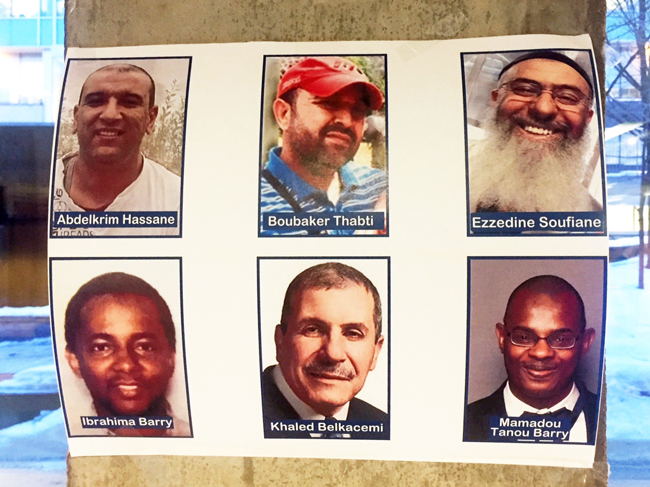
Yesterday, the McGill flag was at half-staff in honour of the six worshippers killed one year ago, on January 29, 2017, in an attack on the Islamic Cultural Centre in Quebec City. On top of the six dead, 19 men were injured.
Over 100 people gathered in the atrium of the Trottier Building in a ceremony organized by the Muslim Students Association, the Institute for Islamic Studies, the Social Equity and Diversity (SEDE) Office, and the Joint Board-Senate Committee on Equity.
The commemoration started with remarks from Associate Provost (Policies, Procedures and Equity) and Professor of Law Angela Campbell, who called for a minute of silence in memory of the victims of the attack.
Organizer Ehab Lotayef, writer, activist, poet and IT manager at McGill, reminded the group that in addition to the six dead and 19 injured, there are now 17 orphans and six widows who deserve support and understanding.
Lotayef reminded the crowd that the best thing to do to counter this destructive and dangerous tendency is to remember.
“We are doing two things to remember this terrible event. We are going to plant a tree on the campus in honour of the dead,” Lotayef said. “And we are working on establishing an award for a student, not necessarily a Muslim, who makes a significant contribution toward encouraging Muslim inclusion.”
Other speakers at the commemoration included Sue Montgomery, newly elected Mayor of NDG Côte des Neiges; student activists, Salma Youssef and Nahal Siraj Fansia; and Professor Pasha M. Khan of the Institute of Islamic Studies at McGill.
“This Islamophobic attack elicited shock and disbelief among many of us. But it is important to remember that there is a pattern of violence in North America, mostly in the U.S. it is true, but a pattern of white supremacist violence toward minorities. There is pressure to assimilate, to disappear into the crowd,” said Khan. “It is important to understand and help advance the causes of all of those in the South Asian community who are oppressed, including women, LGBT people for example.”
One of the most disturbing and telling stories to emerge from the murders at the Islamic Cultural Centre is that of Aymen Derbali. During the attack, Derbali used his body to shield fellow worshippers from the attacker, Alexandre Bissonnette. Shot seven times, Derbali spent two months in a coma and is now a quadriplegic. “I tried not to panic or flee,” said Derbali in an interview. “I tried to concentrate so he wouldn’t fire on others. I would rather be paralyzed for life than to have fled and been left unscathed without having done something to help people.”
There were similar gatherings at Montreal City Hall, in public spaces in Montreal and Quebec City and on campuses across Quebec and Canada.
